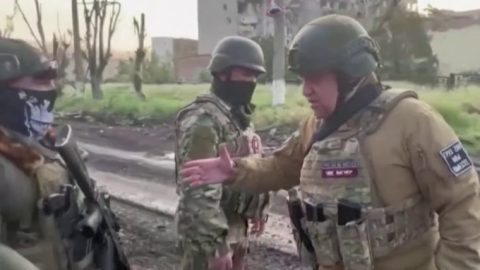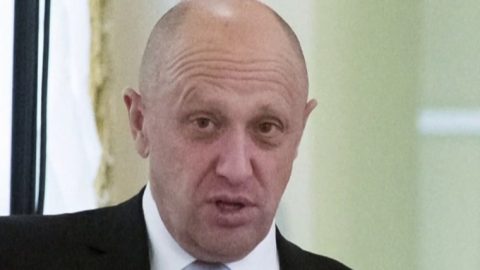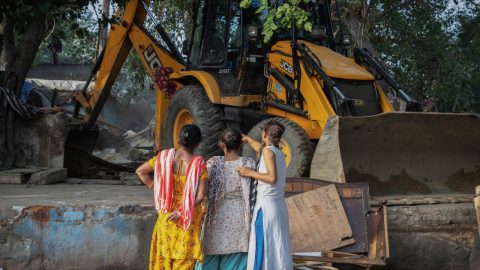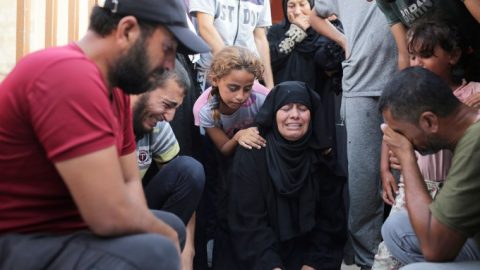Grief turned to fury Thursday night in Beirut, days after a colossal chemical explosion rocked the Lebanese capital and inflamed anger toward the country’s elite.
Protests broke out around the Lebanese parliament building late Thursday, with demonstrators setting fires and jumping onto cars to hurl stones.
Riot police firing tear gas were deployed to the small but violent protest, local broadcaster footage showed, after a day of swelling rage that saw hundreds mob visiting French President Emmanuel Macron, who promised aid and to put pressure on politicians.
“The Lebanese people deserve better than this,” Thea Harmouch, 18, told NBC News via Twitter. “The government’s response isn’t wrong, it’s absent.”
The country’s ruling classes are widely pilloried for being deeply corrupt and ineffective.
Harmouch was making the hour-long trip from Zahle, east of the capital, with a bus full of other teenage volunteers on Friday, to help with the clean-up effort.
“We’re volunteering because we know our government isn’t going to help,” she said.
Download the NBC News app for breaking news and politics
Lebanese Prime Minister Hassan Diab blamed Tuesday’s massive blast on 2,750 tons of ammonium nitrate, a chemical used in fertilizer and bombs, which had been stockpiled in a port warehouse and blew up.
Nineteen people linked to the management of the port and customs have been arrested in connection with the blast, according to local media reports. The bank accounts of seven others had been frozen, the Prosecutor General’s office said.
Bodies are still being fished-out from under the rubble on Friday, pushing the death toll up to at least 154 people, according to the Ministry of Health, with 5,000 injured and some 250,000 homeless.
Dozens are still missing with social media pages helping to reunite families. While others are starting to bury their loved ones as funerals get underway.
Some like Jennifer Moussa, 25, say they are beyond protesting and simply want to leave Lebanon.
“Today, I felt extremely angry and I thought even after the explosion things couldn’t get any worse,” she told NBC News by telephone.
“It’s just too overwhelming…I don’t feel safe anymore at all,” the scientific researcher said. Adding, “Now I want to leave. My sister and brother are saying the same thing.”
The ammonium nitrate that caused the blast arrived in Beirut Port in 2013 on a Russian-owned cargo ship named the Rhosus, the ship’s then-captain, Boris Prokoshev, told NBC News on Thursday.
It was en route from the Georgian port of Batumi to Mozambique, where it was meant to be used as fertilizer, he said. Diab, the prime minister, said the stockpile had been stored at the Beirut port for six years without any “preventive measures” to protect it.
Tuesday’s blast would have been a tragedy in any country but it was especially cruel timing for Lebanon, which is already on its knees and buckling under a stack of spiraling economic, political and healthcare crises.
Many residents see the disaster as symptomatic of the general state of upheaval into which the country has slid.
Some looking for leadership turned to President Macron — Lebanon was a former French colonial protectorate. The European leader told citizens, still reeling from the blast, that no blank checks would be given to Lebanese leaders unless they enacted reforms and ended rife corruption.
Macron also called for an international inquiry into the explosion and said France would organize a global aid conference for the Middle Eastern country.
Humanitarian aid and condolences continued to pour in, with the first U.S. Air Force C-17 flight delivering relief on Thursday carrying food and medical supplies, the U.S. Central Command said in a statement.
Lebanese native Amal Clooney and actor husband George also said in statement they would be donating $100,000 to Lebanese charities helping to provide aid.
Reuters contributed to this report.
Mustafa Kassem, Charlene Gubash and Mosheh Gains contributed.











Recent Comments